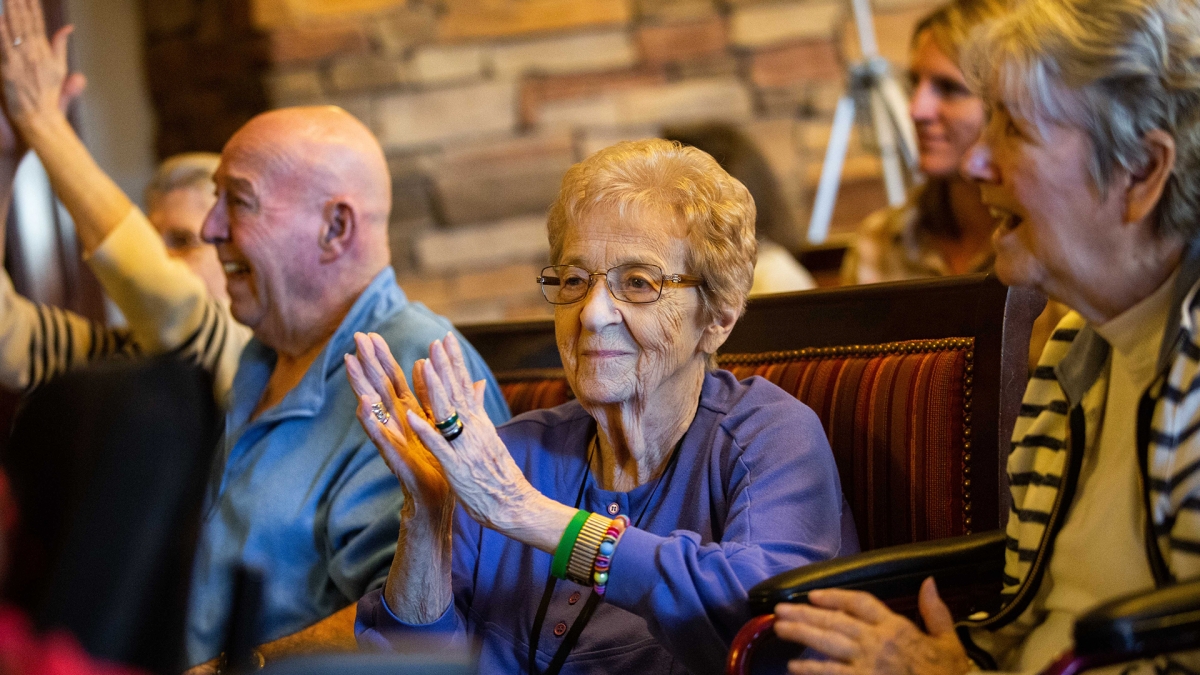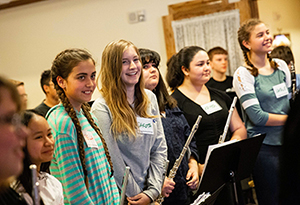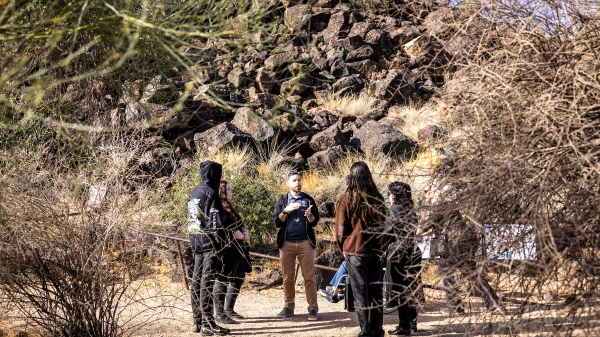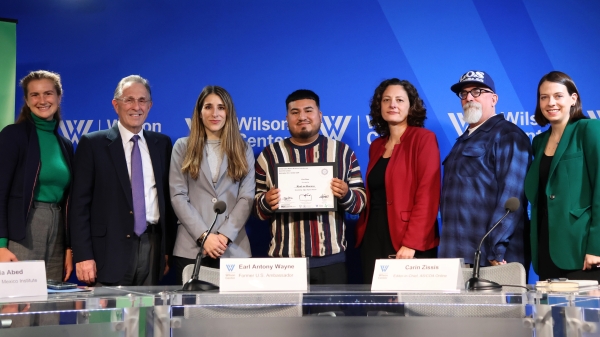ASU School of Music joins community partners for Harmony Bridge ASU intergenerational program

Sunrise Senior Living Community residents. Photo by Deanna Dent/ASU Now
Arizona State University School of Music education, performance and therapy areas recently joined forces with community partners Kyrene Aprende Middle School and Sunrise Senior Living Community to launch Harmony Bridge ASU, a collaborative intergenerational community music partnership.
Musician Michael Levine founded Harmony Bridge, a multifaceted program that connects young students and the elderly through music. He modeled it after Dallas Brass, an international brass and percussion ensemble — also founded by Levine — to bring music to people in their own communities.
“My original idea was bringing music to seniors, but I realized there were so many more layers,” said Levine. “Middle school students develop a new sense of purpose — a new sense of why they play — and discover that they can continue playing the rest of their lives.”
Thanks to grant funding from the Herberger Institute for Design and the Arts Dean’s Creativity Council, several School of Music faculty joined Harmony Bridge in a new partnership with Levine. Faculty participating in the project include Jill Sullivan, associate professor of instrumental music education; Deanna Swoboda, associate professor in tuba performance and longtime acquaintance of Levine, having performed for six years with Dallas Brass; and Melita Belgrave, associate professor in music therapy.
The band program at Kyrene Aprende Middle School, led by alumna Tracy Werner (BMUS ’93 and MM ’00), was selected as the middle school applicant to join the partnership.
As part of the Harmony Bridge program, Aprende band students, Levine and ASU music students and faculty participated in a three-day immersion that included music collaborations and intergenerational skill-building activities and culminated in a performance for senior residents at Sunrise Senior Living in early February.
Harmony Bridge is a threefold approach to music: a teaching method for band directors, a learning process for students and an experiential activity for seniors.
ASU music education students volunteering to work with the middle school students will model musicianship and practice their applications of teaching by facilitating students learning to rehearse, play and improve together. Harmony Bridge ASU also gives ASU students job-related experience by providing them with real-life opportunities while still in school.
“It provides an opportunity for our students to engage skillfully in community musicmaking, to be more confident in their musicmaking skills and to improve how students interact with different age groups in the community,” said Swoboda. “Music education in the ASU School of Music is leading the way, training 21st-century college musicians to think differently about music education.”
Belgrave said the program will also benefit music therapy students at ASU as well as improve attitudes toward aging and the aging process.
“ASU music therapy students will experience the benefits of intergenerational programming and how to make sure that both the younger and older generations’ needs are met,” said Belgrave. “Middle school students will learn how to interact musically and nonmusically with older adults in their community.”
Sullivan said she hopes the partnership instills the love of performing chamber music in middle school students.
“This experience is critical for young musicians to develop their individual skills of sight-reading, musicianship, personal self-confidence and self-accomplishment as an autonomous musicmaker,” said Sullivan. “Students become lifelong musicians confident to enjoy playing alone and with others.”
Harmony Bridge will provide the middle school students to chance to participate in small instrumental ensembles that Swoboda said “cultivates better musicians, develops leadership skills and helps younger musicians discover the power of music.”
“Even in its early stages, I could tell that the program had a great deal of potential to impact school band programs and the larger communities of which they are part,” said Blake Ryall, a doctoral student in music performance who volunteers as a teaching assistant for the program.
Werner, a 25-year veteran band teacher, has been teaching band at Aprende for 21 years and said she is excited to embrace Harmony Bridge as part of her band program.

Students laugh and smile during the first performance of the Harmony Bridge ASU program at Sunrise Senior Living in Chandler in February. Photo by Deanna Dent/ASU Now
“We asked for 25 students to participate in the program and had 42 sixth- to eighth-graders sign up,” said Werner. “The students are really excited to be part of the Harmony Bridge program and have already formed an after-school club.”
ASU students will assist the band director and Aprende students at rehearsals and performances as part of the program.
“I volunteered because it seemed like a really cool opportunity to meet with senior citizens and it’s an excellent music opportunity,” said Hailey, an Aprende eighth-grade band student.
“The event at the senior center with middle school students spoke not only to the potential for music to bridge different generations and demographics together, but also advocated the applications of getting ensembles out of their rehearsal space and into the community,” said Ryall.
The Harmony Bridge program has planned another concert with the students at Sunrise Senior Living before the end of the school year.
Harmony Bridge currently has nine other schools participating in the program throughout the United States.
More Arts, humanities and education

Petroglyph preserve celebrates 30th anniversary with ancient, modern tales
The Deer Valley Petroglyph Preserve provides a beautiful walk through a pristine desert where chuckwalla lizards are as plentiful…

Kaleidoscope short film contest inspires powerful binational filmmaking in its second year
“We come to this country not to steal anybody’s jobs but to take advantage of the opportunities that the rest ignore. We’ve been…

ASU's Neal Lester reflects on life, death of poet Nikki Giovanni
When Neal Lester heard on Monday that poet and activist Nikki Giovanni had died, the news hit hard.Lester, the founding director…